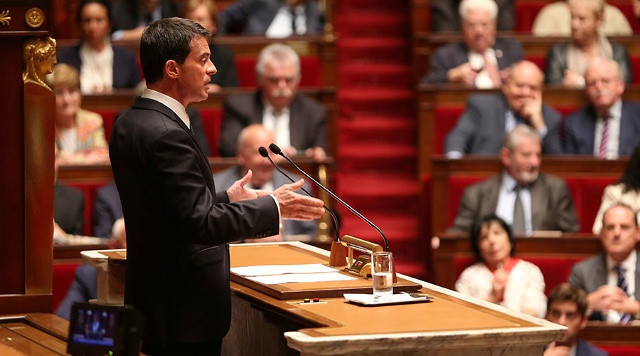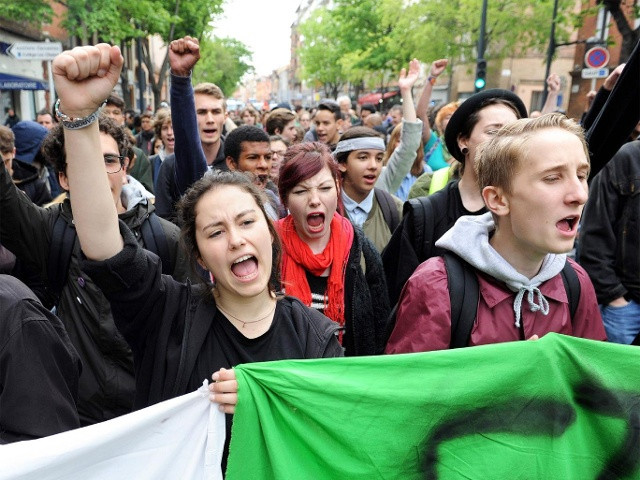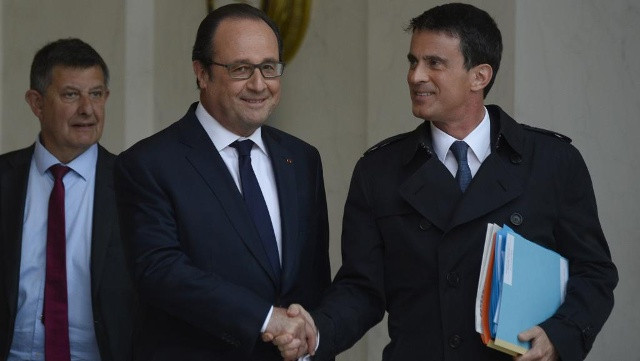French President Hollande's last 'gamble'
(Baonghean) - Without needing approval from the National Assembly, the French Government has decided to use a decree to enact the controversial labor bill in this country. This is considered a decisive step by French President Francois Hollande and the Government, but at the same time poses the risk of the Government being voted out of confidence, and Mr. Hollande himself will find it difficult to run for the next presidential term.
 |
| Prime Minister Manuel Valls announced the decision to issue the bill without going through the National Assembly. Photo: Reuters. |
"Ignoring" the National Assembly
The French government has applied Article 49.3 of the Constitution, which allows the promulgation of a law and "bypassing" the National Assembly. Accordingly, the French President can sign the above bill into law without waiting for the National Assembly to approve it.
The French government's "shortcut" move is aimed at overcoming the current massive public opposition to the labor bill - considered one of the most important reforms in the four-year term of French President Francois Hollande.
This move shows that President Hollande has kept his previous statement that the government will not withdraw the new labor bill despite pressure from strong protests across France in recent times.
The new French labor bill, drafted by Labor Minister Myriam El Khomri, includes provisions that allow employers to lay off workers if they are forced to restructure to save the business; set a maximum compensation limit for employees equivalent to 15 months' salary even if they have worked at the company for up to 20 years; expand the working week limit to 46 hours from the current 35 hours based on the principle of consensus between employers and employees; propose to increase taxes on short-term contracts to encourage organizations and businesses to hire long-term workers, etc.
Immediately after being introduced on February 18, the new labor bill caused a strong reaction among the people. A series of protests took place across France, culminating in the demonstration on March 31 when 390,000 people took to the streets, leading to many violent clashes.
Following this event, the French government had to make some concessions by introducing some amendments, including removing the regulation on maximum compensation when firing workers. However, these amendments still did not meet the expectations of trade unions, leading to a large protest at the end of April - a protest that attracted up to 170,000 people and later turned violent.
 |
| French people protest against the Government's decision in Toulouse. Photo: Getty. |
Short-term benefits conflict with long-term goals
The strong reaction of the French public comes from the fact that the impacts of the new labor bill are viewed from two opposite directions. French President Francois Hollande believes that loosening the previously rigid labor laws will "untie" businesses, encourage businesses to hire workers. Thereby helping France reduce the unemployment rate that has increased rapidly in the past 2 years (currently at 10.6%).
Meanwhile, trade unions say the provisions in the bill are too strict for workers. This is an understandable reaction as France is one of the countries with the highest levels of social security and employment in the European Union.
Another problem with the labor bill is the incentive for organizations and businesses to hire people on long-term contracts. The government believes that hiring people on long-term contracts will create stability for workers.
However, French youth believe that the long-term effectiveness is unknown, and that this regulation will put young people in an increasingly precarious situation. The reason is that young people are currently the ones businesses often sign short-term contracts with, and for young people, signing the first contract is the biggest "barrier" when entering the labor market - regardless of whether it is short-term or long-term.
It is worth recalling that in France, 25% of young people aged 18-24 are unemployed - twice the national average. That is the reason why young people have always made up a large force in anti-government protests over the past time.
 |
| President Francois Hollande and Prime Minister Manuel Valls after announcing the Government's decision. Photo: AFP. |
President Hollande's "gamble"
Hundreds of protesters gathered outside the National Assembly building after the government decided to pass a new labor bill without going through the National Assembly. They demanded the government withdraw the bill and called for President Hollande to resign.
Experts predict that this is just the beginning of a wave of strong protests that will continue to take place in the near future. However, the French Government is still determined to maintain its ambition to carry out a "radical reform", considering the amendment of the Labor Law as a "restructuring measure" to improve the job market.
The public is now waiting to see how the French Government and President Francois Hollande personally will face the public's anger. If the risk for the French Government is a vote of no confidence today (May 12) for "ignoring" the National Assembly, then the risk for Mr. Francois Hollande is losing the ability to run for a second term.
Since being elected President, Mr. Hollande has declared that he will only consider running for re-election in 2017 if he can reverse the unemployment rate in France. During the 4 years under the leadership of President Hollande, the unemployment rate in France has not only not improved but has also increased, especially among the youth.
So is the only hope left for Mr. Hollande now, a new labor bill that can help him fulfill his commitment in the short time between now and February 2017? Will the French government “break down halfway”? This is truly a “50-50 gamble” for French President Francois Hollande personally in the final stage of his term.
Thuy Ngoc


